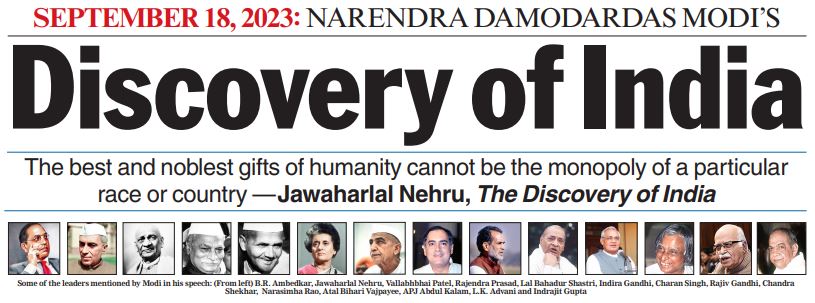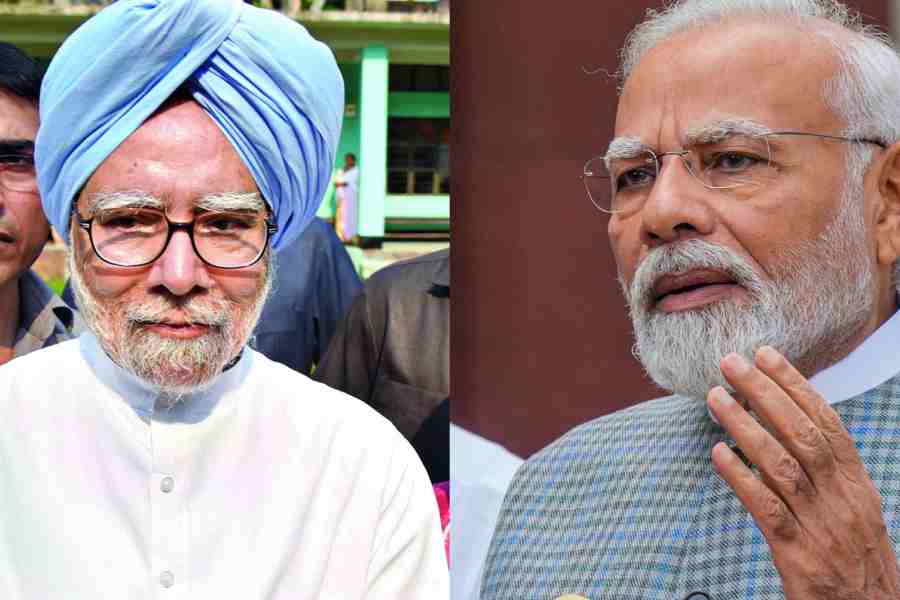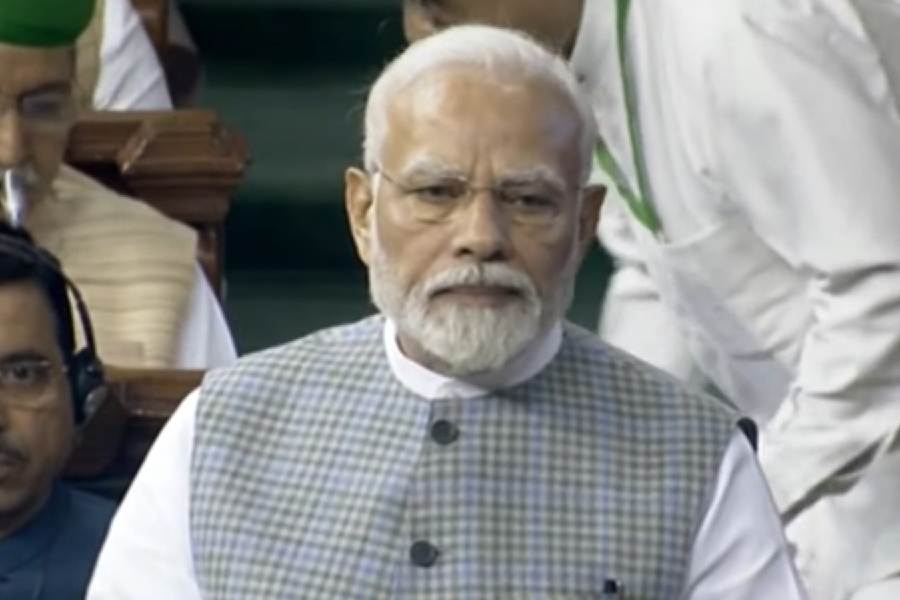Prime Minister Narendra Modi on Monday appeared to have found the answer to a question he has been asking for nine years now: What has India achieved in 70 years since Independence?
Speaking for the last time in the old Parliament building before proceedings shift to the new complex on Tuesday, Modi not only recalled Jawaharlal Nehru’s Tryst with Destiny speech but also acknowledged the “countless democratic traditions” that took root during the post-Independence decades and the “collective efforts” to build the nation.
Describing India as “Vishwa-mitra”, a friendly nation that can unite the world, Modi said all Prime Ministers had provided guidance to the country, using phrases such as “collective legacy” and “collective pride” and avoiding his “ek-akela” bluster.

He made passing references to the creation of Bangladesh during Indira Gandhi’s tenure, the reduction in the voting age to 18 years by Rajiv Gandhi as Prime Minister, the economic liberalisation under P.V. Narasimha Rao and the nuclear tests during Atal Bihari Vajpayee’s term.
In a speech that was unusual for someone who has spent the past nine years arguing India had achieved nothing till 2014 when he came to power, Modi also acknowledged the contributions of B.R. Ambedkar, Indrajit Gupta, Chandra Shekhar, L.K. Advani and Charan Singh.
The attempt appeared to be to avoid rancour and bitterness on the last day of proceedings in the old Lok Sabha, an edifice that was witness to the rise of Indian democracy since the sittings of the Constituent Assembly.
But the rare nod to magnanimity left out Manmohan Singh, whose tenure Modi remembered only for the “cash for vote” scandal — an allegation that some MPs were bribed to vote in favour of the UPA government in 2008 in a no-confidence motion after the Left withdrew support protesting the nuclear deal with the US.
The Congress forcefully confronted Modi, with its leader in the Lok Sabha Adhir Chowdhury listing the exemplary achievements of Manmohan Singh’s 10 years -- the Right to Information (RTI), MGNREGA, Right to Education, Food Security Act, Forest Rights Act, Land Acquisition Act and Street Vendors Act.
Besides holding up the radical laws the Manmohan Singh government had brought in, he underlined that the US sanctions imposed on India after the Pokhran blast were removed when Manmohan expanded ties with the Americans.
The Congress leader drew a contrast with the Modi government’s performance -- listing the demonetisation, the flawed GST, the scrapping of Jammu and Kashmir’s special status under Article 370, CAA-NRC, and the farm laws which it was forced to withdraw. He also mentioned the digital data protection law, which the entire Opposition has resisted.
Another claim by Modi, that Telangana had been carved out amid bitterness and bloodbath unlike the peaceful creation of Jharkhand, Chhattisgarh and Uttarakhand during BJP rule, angered the Opposition.
Adhir said the CBI-ED were being misused to target Opposition leaders during Modi’s tenure, Opposition MPs were not being allowed to raise critical issues and bills were being passed without discussion.
He raised the curtailment of the freedom of speech even in the context of members of Parliament and said unfavourable observations about the government were often expunged. He referred to social democracy, arguing that the constitutional principles of liberty, equality and fraternity were in peril. Describing pluralism as the essence of civilisation, he tried to drop a subtle hint about the divisive politics the BJP pursues.
The Opposition leader also recalled the arduous nation-building process by Nehru and the foundations he laid for industrialisation, the development of science and technology, apart from the progressive legislation and achievements by Congress governments, including the Representation of the People Act, Essential Commodities Act, Anti-Defection Act, Child Labour act, Prevention of Atrocities on SC-ST Act, Panchayati Raj, MPLADS, the Green Revolution, promotion of information technology, and the nationalisation of banks.
Without criticising Modi, the DMK’s T.R. Baalu said Vajpayee was a “gentleman politician” and a statesman who didn’t bear any animosity towards the minorities.
Trinamul’s Sudip Bandopadhyay stressed the importance of secularism, social harmony and unity. He said that while a midnight session had been called to adopt a flawed GST, critical national issues were not being allowed to be raised in Parliament.
The JDU’s Giridhar Yadav lamented the degeneration in constitutional culture, arguing that even the Prime Minister had asked people to vote in the name of Bajrangbali, an act for which a leader should be disqualified.
The DMK’s A. Raja expressed surprise at the tone and tenor of the Prime Minister’s speech on Monday, after he had denigrated Nehru and followed an agenda that allegedly endangered social harmony and violated constitutional morality over the past decade.











